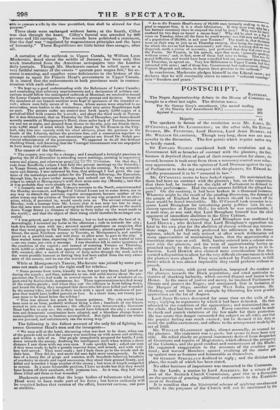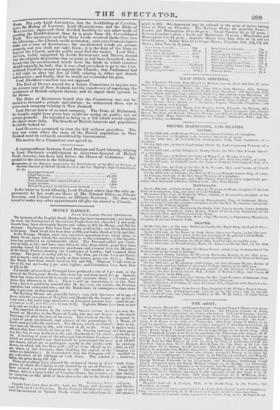POSTSCRIPT.
SATURDAY. of Commons was The Negro Apprenticeship debate in the House brought to a close last night. The division was—
reading 269 205 Majority 64 For Sir George Grey's amendment, (the second of the Slavery Act Amendment Bill,) Against it
The speakers in favour of the resolution were Mr. JAMES, M. O'CONNELL, and Dr. LUSHINGTON; on the other side, Sir EDWARD SUCHEN, Mr. PLUMPTRE, Lord HOWICK, Lord JOHN RUSSELL, MA Mr. WILLIAM GLADSTONE. Though very long, there was not much novelty in the discussion. The few points which require notice tray be briefly stated.
Sir EDWARD SUGDEN considered both the resolution and the Government bill as breaches of contract with the planters; the first, because it deprived them of part of their compensation for slaves; the second, because it took away from them a necessary control over refrac- tory apprentices. As to the opinion of Lord Dentnan against the right of Parliament to make any compact with the planters, Sir Edward de. cidedly pronounced it to be "unsound in law."
Mr. O'CONNELL seems to have lacked vigour. He maintained that there bad been no contract with the planters; but, on time supposition that there had, he insisted on the right of Parliament to demand its complete performance. Had the slave-owners fulfilled the alleged bar. gain ? On the contrary, it had been broken in a thousand instances. Whatever might be the result of the pending discussion, the demand of the people of England that the last fetters should be struck off the slave would be found irresistible. Mr. O'Connell took occasion to re- prove Lord Brougham for introducing party politics into his anti. slavery speeches at Exeter Hull ; for which he was unpardonable, if it were true, as was said, that Lord Brougham himself was the chief opponent of immediate abolition in the Grey Cabinet. This last statement respecting Lord Brougham was confirmed by Lord HOWICK ; who declared that Lord Brougham's opposition was fatal to his own plan for the abolition of slavery without any interme- diate stage. Lord Howick professed his adherence to his former opinion, which lie had only arrived at after much deliberation and many opportunities of ascertaining facts, that the apprenticeship or transition state was an evil. Still, having entered into a solemn cove. nant with the planters, and the term of apprenticeship having ap- proached nearly to the close, he would not now be a party to its in- fraction. Lord Howiek also claimed more consideration than there seemed a disposition to allow for the very difficult circumstances in which the planters were placed. They were ordered by Parliament to fulfil duties which it was almost impossible they could perform without re- proach.
Dr. LUSHINGTON, with great animation, impugned the conduct of the planters towards the Black population ; amid cited particular in- stances of shocking barbarity, which created disgust and horror in the House. In the name of justice and mercy, be implored Parliament to liberate and protect the Negro ; and announced, that in imitation of the Marquis of Sligo, another great West India proprietor, Mr. Hankey, would set them an example by liberating his own probal apprentices on the 1st of August. Lord JOHN RUSSELL descanted for some time on the evils of sla- very ; replyieg to arguments by which it had been defended. He then advel ted to the condition of the apprentices ; and maintained that, on the whole, they had been well treated. Every exertion would be made to check and punish violations of the law made for their protection. lie was aware that danger surrounded the subject on all sides, and that the popular feeling was much excited ; but he deemed it his duty to resist the public excitement, and adhere to the arrtmgernent made by the act of 1833, Mr. WILLIAM GLADSTONE spoke, almost avowedly, as counsel for the planters. His statement was ex parte, but seems to have been very able. He relied chiefly on general statements derived from despatches of Governors and reports of Magistrates, which affirmed the prosperity of the Colonies, and the good conduct and contentment of the Blacks. lie suggested exaggeration in the accounts of the cruelties prac- tised; and warned Members against crediting all the stories got up against men as humane and honourable as themselves. Sir GEORGE STRICKLAND declined IO reply ; and the division took place, the result of which has been stated. No other business of importance was transacted in the Commons. In the Lords, a motion by Lord ABERDEEN, for a return of the cost of the Scottish Church Commission, gave rise to a discuss.mon on the question of granting additiotial endowineets to the Establish- ment in Scotland.
It is manifest that the Ministerial scheme of applying unexhausted teinds to the purposes of the Church will not be sanctioned by the
pen. Not only Lord ABEREEEN, but the Archbishop of CANTER. city the Bishop of LoNnori, Lord HADDINGTON, and the Duke of 3WELt1NTON expressed their decided hostility to any other mode of acsiating the Establishmentthan by a grant from the Consolidated ad, The arguments used by these Lords resolved themselves into e flowing,—the Church needs assistance' your own Commissioners th
rake out a case of destitution ; the unexhansted teinds are private eroperth and
you shall not take them ; it is the duty of the State to ;upport the Church, and the public must find the means. Lord NIF.1.- BOURNE, feebly supported by Lords ROSEBERRY and !lima), denied that the religious destitution was so great as had been described ; main- ained that the unexhausted teinds were the funds to which recourse should naturally be had ; that it was a bad precedent to go to the Con- solidated Fund for money to support the Church; that Parliament had a full right to alter the Act of 1707, relating to tithes arid church endowments ; and finally, that he would not reconsider his plan.
Lord Aberdeen's motion was not opposed.
The Earl of DEVON moved for a Select Committee to inquire into the present state of New Zealand, and the expediency of regulating the settlement of British subjects therein, and to report their opinion to the House.
The Duke of RICHMOND hoped that the Committee was not in- tended to forward a private speculation; he understood there was a joint-stock company relating to New Zealand.
Lord DEVON knew of no such company. The Duke of Richmond, be thought, might have given him credit for acting on public, not on private grounds. He intended to bring in a bill which would explain his object more fully. The benefit of British interests and population he chiefly looked to.
Lord GLENEI.G promised to view the bill without prejudice. The time was come when the state of the British population in New Zealand must be seriously considered by Government.
The motion for a Committee was agreed to.



























 Previous page
Previous page